- About Us
- Columns
- Letters
- Cartoons
- The Udder Limits
- Archives
- Ezy Reading Archive
- 2024 Cud Archives
- 2023 Cud Archives
- 2022 Cud Archives
- 2021 Cud Archives
- 2020 Cud Archives
- 2015-2019
- 2010-2014
- 2004-2009
 |
Cud Flashes In The Pan |
Springtime has long been symbolic of rebirth and change. But rebirth and change aren’t always good, even though they have a pretty solid reputation for being such. In this month’s stories, our characters deal with some difficult changes in a springtime season they might just as soon forget.
“In the Balance”
Sword & Sorcery
By David M. Fitzpatrick
“On the vernal equinox, you must be atop Mount Valtor at sunrise,” said the old wizard to his apprentice, Jaethro. “When the first rays of the sun light the peak with spring, a flower will bloom—the only one of its kind anywhere—and live for just a few minutes.”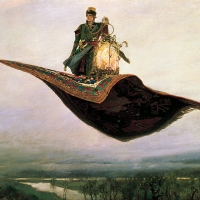
“I’m to pluck the flower and return it to you?” Jaethro said.
“No!” the wizard snapped. “Never pluck it. You must gather half its pollen, then half its petals, before the flower wilts and dies and turns to dust. The flower will prolong my life. Its magic is about rebirth; as the lone child of the moment of springtime, it carries with it a balance of all the seasons of the world.”
“I understand,” Jaethro said.
“All things must be in balance,” the wizard said. “You must follow my instructions perfectly. Now, repeat them back to me.”
Jaethro did, several times, until the wizard was satisfied.
* * *
Jaethro rode wizard’s flying carpet to the hazy Mount Valtor in the east. It took hours, but soon he landed on the highest peak. He made camp at sunset, then drank a potion the wizard had given him to keep him awake so that he wouldn’t miss the moment.
His excitement grew as the sky began to brighten, and then he saw the flower break through the earth. Its green stalk thickened and lengthened, unfurling and spreading leaves wide. A mass of tissue in the center bulged up, and Jaethro saw bits of yellow, red, and purple within.
The sun finally flashed over the distant horizon, and when the rays hit the flower, it quickly bloomed. It grew ever larger as it spread a rainbow of petals wide. And there it was, the flower of the seasons, blooming for just a few minutes with the equinotical sun.
Jaethro squatted unsteadily and quickly scraped pollen from the center of the flower into his leather pouch. It fell like the magic dust it was, and he scraped faster. He didn’t want to run out of time.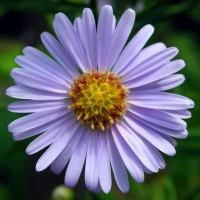
He figured he had half the pollen, and was about to pluck the petals, when he faltered in his squatting balancing act. He tumbled backward and lost the pouch. The pollen puffed out of it, billowing in a wind-swirled cloud before dissipating. Jaethro cried out in anguish.
He looked at the flower, whose petals were already drying at the edges, whose stalk was beginning to sag. He didn’t have time to do it again. He could go home empty-handed, and the wizard would have to wait another year—or he could pluck the flower. The old man was so melodramatic about things; Jaethro wouldn’t destroy the balance of the world. Besides, he didn’t want to incur the wizard’s wrath at having failed.
With that, he reached out, grasped the stalk with one hand, and plucked the flower off with the other.
He watched as the stalk and leaves withered quickly to blackness, then turned to dust and blew away. But the flower in his hand seemed frozen in its death. Jaethro sat on the ground and took his time harvesting the pollen and the petals. Then he tossed the flower aside, leaped on his flying carpet, and flew westward toward home as the rising sun shined behind him.
* * *
As soon as he stepped into the wizard’s chambers, he was met with the old man’s wild eyes.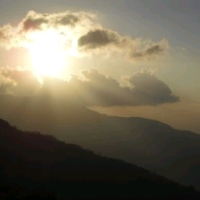
“What have you done?” the wizard cried. “You had specific instructions. You’ve betrayed me… and the spirit of our world!”
Jaethro’s heart pounded. “I… got what you asked.”
“You destroyed the flower,” the wizard claimed. “You’ve upset the balance!”
Jaethro felt his blood cool. “But… what could it hurt? It’s just a flower.”
“Look outside, boy,” the tired wizard said.
Jaethro staggered outside, looked up at the dimming sky.
In the east, the sun was setting behind Mount Valtor.
“Mud Season”
Fantasy Horror
By David M. Fitzpatrick
He first killed on the night of the summer solstice. He’d met the beautiful young girl in a tavern in a kingdom he was passing through.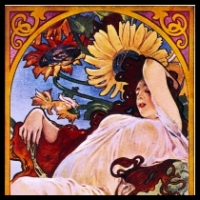 Jerica had cascading hair, golden like the summer sun, and he had sex with her at an inn. When he took her for a walk at the outskirts of town, he was overwhelmed by a desire to club her with a big stick and then behead her with his knife. He dumped her body in the woods and said a sacrificial prayer to Annulus, the goddess of the seasons, in honor of the day.
Jerica had cascading hair, golden like the summer sun, and he had sex with her at an inn. When he took her for a walk at the outskirts of town, he was overwhelmed by a desire to club her with a big stick and then behead her with his knife. He dumped her body in the woods and said a sacrificial prayer to Annulus, the goddess of the seasons, in honor of the day.
On the night of the atumnal equinox, in another kingdom, the urge struck him again, and he knew it was Annulus demanding another sacrifice. He connected with Shayla, a lonely girl whose red hair reminded him of the changing leaves of the trees. He screwed her madly in some farmer’s wagon before beating her unconscious with his fists and hacking off her head. Then he fled, shouting gleeful prayers to Annulus.
On the icy night of the winter solstice, in a cold northern kingdom, he met the fifty-something Keshaleen in the tavern she owned, inherited from her husband, dead five years. Her pretty, lined face was topped by with snow-white hair, and she was trim and athletic. After she closed the tavern, he gave the horny old gal what she wanted—on the bar and over a beer keg, and finishing with her riding him in her back-room bed. When he finished, still inside her, he smashed her head into the wall in religious rapture. He left her headless body there, calling out fierce prayers to Annulus in the frigid night.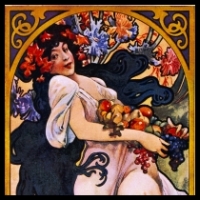
On the vernal equinox, in another tavern in another kingdom, he found Luralee: cute, tiny, small-breasted, narrow-hipped, fresh, innocent—and young and vibrant, the perfect symbol of spring. After hours of drinks, he was about to close the deal when she said how she hated the fifth season. This confused him, and he told her so.
“You’re from away,” the elfin lass said with a girlish smile. “We have Mud Season, before winter is over and spring begins—when the melting snow turns the roads into mud pits, and horses and wagons get terribly mired.”
“But that’s not a real season,” he argued.
She laughed and drank and talked about Mud Season, and he thought about this concept. She was very drunk, and eagerly accompanied him to the river that night. There, he put her on her hands and knees in the tall grass, and did her hard from behind. As she wailed, he could see the muddy riverbanks just beyond, and knew it was perfect. When he was done, he caved in the back of her skull with a rock.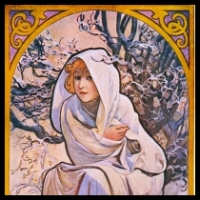
He rolled her body down the riverbank, watching it tumble through the mud. Then he slid down the bank to the water’s edge and went to work removing her head. He dropped it in the bloody mud and stood to pray to Annulus.
His feet were mired in the mud. When he tried to lift a foot, he couldn’t. The other was stuck, too. Slight panic set in; being discovered with the headless girl would mean immediate execution. He realized he had to pray furiously to Annulus, so he threw his hands and eyes skyward, crying out, “I’ve given you four sacrifices, great Annulus! Please, reward my service, and I’ll honor you every season.”
Behind him, a rustling. He looked over his shoulder… and sucked in his breath.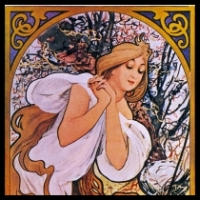
Luralee’s headless body had struggled to its feet. It picked up its head, seated it askew on its bloody neck, and beheld him with dead eyes.
“I shall reward you, cruel mortal,” came the godly voice of Annulus from Luralee’s gaping mouth. “You’ll spend eternity in Mud Season.”
The suction increased, and he felt his legs sink deeper into the mud. He screamed into the night as the zombie face of Luralee watched. The muddy banks drew him in, past his waist, up to his chest. He flailed and struggled against it, but he couldn’t stop it. Finally, his head disappeared as the mud swallowed him.
But his consciousness continued forever.
“After the Monsters”
Science fiction
By David M. Fitzpatrick
I started bleeding in the spring. I was the first, but it will happen to all of us girls. It’s a great honor, because we’re keeping humanity alive.
We were all infants when the monsters destroyed the world. Dr. John told us about life before the apocalypse, when there were still men and women; they fell in love, he said, and got married and had children. And Dr. John always told us what to expect as we got older—like the bleeding.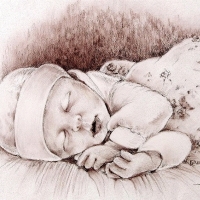
“I’m the wrong person to explain these things,” he’d always say. “But all the women are gone.”
Dr. John had taught us reading, writing, and the history of the world before the monsters—winged dragons, he said—came and destroyed everyone and everything. Everyone fled, but none survived. He always looked sad when he talked about it.
“They were so terrible,” he remembered. “The world… is full of monsters.”
Sometimes, we’ll hear one roaring, and we’ll ring the alarm bell inside the fence. We all rush into the emergency cellar until the monster is gone. None have seen us yet, but I’ve seen them—so big and frightening, like something from a nightmare.
Dr. John explained that we were all the people left on Earth, and it was up to us to “repopulate the planet,” as he said it. Men and women used to do that. There used to be places called hospitals, where newborn babies came into the world; when the monsters came, Dr. John rescued us from a hospital. He’d weep when he’d remember the babies he couldn’t rescue, and tell us how he wished he’d have rescued some boys, too.
When I began to bleed, Dr. John hugged me with his sad smile, and told me I would come to his bedchambers that night. It was time for me to become one of the mothers of the human race. I was proud of that thought, and eager for bedtime all day.
That morning, Dr. John went outside the fence to make repairs while we did laundry in the yard, among the mud and remaining snow and ice. He’d left the gate open when I heard him talking, so I peeked out.
There was another man like Dr. John there. He was younger, and he carried a bag strapped to his back, and he looked surprised.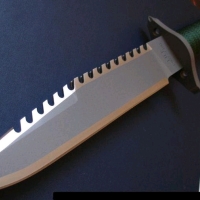
“Just me and my daughters live here,” Dr. John said.
“Way up here in the hills?” the man asked. “That’s weird.”
I was astounded that there was another man, and was about to call out in greeting when suddenly Mr. John struck the man in the face. The stranger went down, and Dr. John leaped atop him, pulled his hunting knife, and plunged it into his chest. There was so much blood on the patches of snow and the first green grasses of the year.
I ran away before Dr. John saw me.
* * *
Dr. John was a liar. There were other people, and Dr. John didn’t want them to know about us—or us to know about them. He wanted all of us to himself. This angered me.
That night, when he called me into his bedchambers, I grabbed his knife and leaped atop him, as he’d done to the stranger, and sank the blade into his chest. I watched as he gasped and gurgled, blood pouring from his wound and bubbling from his mouth.
When he was dead, I told the girls. They cried and screamed, but when I took them outside and found the fresh grave not far from the fence, they believed me. We dug the dirt, and when they saw he was a man, they listened when I explained Dr. John’s lie. And I told them the truth.
* * *
Springtime has new meaning for us. We’d lived with Dr. John and his lies, but now we’re reborn. We take care of ourselves just fine, now that we know the truth: that there are other men who survived the monsters, and others will eventually come, and we’ll have them to give us babies.
We watch for the monsters. I see them all the time, flying overhead, screeching their terrible roars. They glint silver and white in the sunlight, their rigid, never-flapping wings holding them aloft, trails of white smoke spewing behind them. I curse when I see them, for I fear they’re scaring away any men who might otherwise come and help us repopulate the planet.
But they’ll come. It’s just a matter of time.
“Sunrise”
Science fiction
By David M. Fitzpatrick
The sun wasn’t up yet, but it had been daybreak at the station on the planet Zeldor since the team had been there. Today was different.
Lieutenant Jim Fletcher fought his anxiety as he reported to Commander Nickles. “The power core is dead,” he said. “This station isn’t moving.”
Nickles sighed. “Any other time, we’d be able to send out a distress call.” He looked eastward out the window, toward the horizon. It glowed fiercely red, as if a fire raged just beyond. “Had to happen in Zeldor’s spring. How long?”
“Two days. We evacuate now, we stay ahead of it.”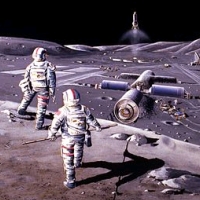
“When’s summer?”
“Twenty-two days, thanks to Zeldor’s close orbit. We’ll be safe in the buggies, so long as we stay ahead of the sunrise.”
Nickles smiled. “Nothing like a little risk and danger to spice up research, hey, Lieutenant?”
“Well, I joined for the adventure, sir, but I’d prefer less of it right now.”
* * *
It took Fletcher six hours to get the twenty-person complement loaded into the two all-terrain crawlers, along with six weeks of food, water, and oxygen—double what Fletcher estimated they’d need. They’d take the buggies steadily westward—not too fast, staying just ahead of the sunrise, so they could signal for help as soon as Zeldor cleared the blazing star and entered its summer.
He stood on Zeldor’s barren surface, looking past the hobbled station at the brightening horizon. Even though they had a day and a half before sunrise, he was terrified—as if the sun would burst over the horizon at any moment and fry them all. It was a mighty sight: the sky red-orange, bright enough to blot out black space and twinkling stars.
Zeldor was not quite tidally locked with its star. At first glance, it seemed that it was, but its revolution was slightly slower than its orbit. The mobile station crawled across the surface, staying just ahead of the sunrise. On the other side of the world, at the sunset point, a similar station crawled toward the sunset, studying the charred surface.
“Move out,” came Nickles’ voice over his comm.
Adventure, indeed. Fletcher longed for boring times on Earth—relaxing in the sun, feet up, drinking pink lemonade, watching birds flit about and grasses waving lazily in the breeze.
He headed for his buggy.
* * *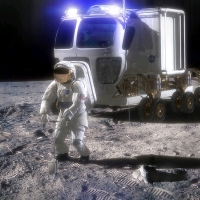
They drove for eighteen days, long after Fletcher knew the dead station was a puddle of liquid metal. And late that day, they hit the end of the line. Fletcher felt his heart freeze when he saw it. He stopped his buggy as Nickles stopped his.
“You see this?” Nickles asked over the radio.
“There must have been quake activity,” Fletcher said. “Satellite maps last reported this region clear.”
The forty-foot-wide chasm yawning before them stretched north and south as far as they could see. The station could have cleared it with its extender bridges, but not the buggies. Fletcher worked the computer even as he heard his passengers below wondering what was up. “No end either way for the few miles the scanners can read,” Fletcher reported.
This wasn’t adventure any longer. It wasn’t even risk and danger. It was deadly circumstances. Life or death.
“I’ll take my buggy north,” Nickles asked. “You head south.”
It was the logical choice—doubling the chances of one group, at least, surviving.
* * *
The eastern sky burned brighter with every moment. Fletcher drove without sleep for a day as fast as the buggy could go. And finally, suddenly, the crevice tapered to its end. He whooped in excitement, guided the buggy around it, and sped westward. He raised Nickles on the radio with the news.
“No luck here yet,” Nickles said. “I’ll let you know when we find a way around.”
* * *
Fletcher turned the controls over to someone else for a few hours of sleep. He was back at the wheel in time for Nickles to call.
“We’re… finished,” Nickles breathed. “The chasm… getting wider. You got… the better route, Lieutenant.”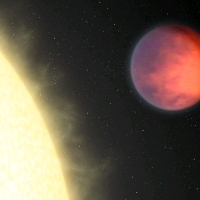
Fletcher could almost feel the man’s sweat. The whole thing seemed unreal.
“The sun is about to rise,” Nickles said. “I’m feeding you video… transferring our data…”
Fletcher felt the hollow pit in his gut. “Understood.”
The video feed came on, and he saw the interior camera from Nickles’ buggy, pointed out the window. The eastern sky was a brilliant red, the horizon a blinding crimson line. And right then, as he watched, the sun appeared in all its blazing, hellish fury. Nearly as wide as the horizon, it rose into the sky, and the very rock of the planet seemed to burn. Fletcher could only watch in horror.
And the audio was on. Fletcher heard the people’s cries as the heat intensified, heard the roar of the air conditioning trying mightily to cool the inside. But it only worked until the buggy began to come apart in a melting ooze of bubbling metal.
Fletcher closed his eyes as the people screamed. Thankfully, he didn’t have to wait long.
He forged ahead. Once they were rescued, he planned to return to Earth. But no sunny-day relaxation—rain, that was what he wanted. He’d sit in it, getting soaked, without birds or wavy grasses.
In fact, he wondered if he’d ever enjoy a sunny day again.
David M. Fitzpatrick is a fiction writer in Maine, USA. His many short-stories have appeared in print magazines and anthologies around the world. He writes for a newspaper, writes fiction, edits anthologies and teaches creative writing. Visit him at www.fitz42.net/writer to learn more.
